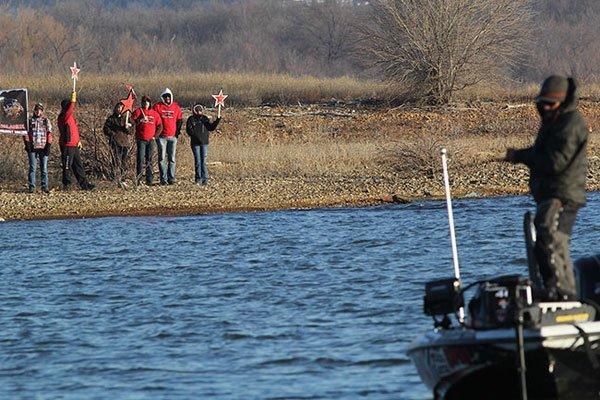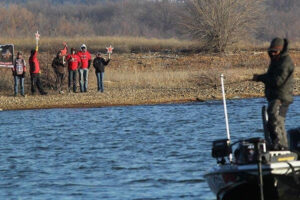If you were to Google “Brandon Palaniuk” a few years ago, you probably wouldn’t have found much. You might have run across some mentions of an up-and-coming Federation Nation angler, but it’s a totally different story these days—more than 46,000 results in a click. With a win and a second-place finish in Elite Series events, two Super 6 Bassmaster Classic appearances and now a second-place finish in the 2013 Classic, the 25-year-old from small town Idaho is drawing regular comparisons to the legends of our sport.
The young man can flat-out fish. We all know that, but what about the man behind the fishing rod? After a rapid rise to bass fishing fame, Palaniuk is taking his success in stride, remaining remarkably humble as he continues to chase his childhood dream.
It’s all in his head
The mental side of bass fishing thrusted Palaniuk into the limelight very early in his career. When he’s sharing water with the best anglers in the world, his mental toughness helps him keep his eye on the prize.
“Once you get to the Elite Series, the mechanics of fishing—the bait placement, presentations and technical skill—is pretty level,” Palaniuk said. “Mental toughness separates good anglers from great anglers, especially in pressured situations. I feel like it’s always been a strong suit of mine because I don’t let many distractions get to me. I make a decision to switch off my day-to-day life for 8 hours and totally focus on catching five bass. That’s all I’m worried about when I’m out there.”
Growing up as a standout wrestler with a tri-state title and two state championships under his belt, he largely attributes his wrestling days to his killer instinct on the water. The competitive nature earns big dividends in the Elite Series.
“I just have an insane drive to win,” Palaniuk said. “I have so much respect for the stars of this sport, and it’d be amazing if I could be as good as they are. As crazy as it sounds though, I want to be better.”
Confidence is key
Upon meeting Palaniuk, you’ll notice a unique blend of humility and confidence stemming from his young energy for the sport. While many anglers would point to their fishing ability as their reason for confidence, he has a much different train of thought.
“I feel like I can beat anyone on any given day, but the beauty of this sport is that anyone can win or get beat in any event,” Palaniuk said. “My confidence just comes from having fun. If I go out there and have a good time competing, I fish loose which allows me to perform better. If you don’t feel like you can win, you’re wasting your time.”
In his short career, he’s already gained a reputation of being a progressive thinker. When he’s preparing for tournaments, Palaniuk increases his confidence by targeting big bass with unconventional techniques.
“There’s a huge difference between finding ‘check’ fish and ‘winning’ fish,” Palaniuk said. “Anytime I can find areas and techniques off the beaten path like I did at Bull Shoals and Green Bay, my confidence increases. In this year’ s Classic, I found my best spot last February and would catch 3- and 4-pounders every time I stopped there, and I never saw anyone else fishing it. That’s what gave me the confidence I needed to compete for the win.”
Decision making
As we watched Palaniuk weigh in on the final day of the 2013 Classic, his good friend and traveling partner, Ish Monroe leaned over to us and said, “He makes decisions already that guys don’t make until they’re 30 or 35. He’s going to win a lot. He works hard at it, but he makes even better decisions.”
For a young angler to come into the highest level of bass fishing with such a clear head is almost unheard of. We’re used to seeing the young guns gradually progress through a fairly large learning curve, but it seems Palaniuk has been educated since day one.
“I think it all comes from how badly I want it,” Palaniuk said. “I want to be the best. Cashing a check is great, but I want to win every event I fish. Even though I’m young and don’t have the experience that many of the veterans do, I’ve put the large majority of my life into this sport. The more time you put in and the more situations you can put yourself in, the quicker the light bulb goes off. We’ve only got 8 hours each day to prove ourselves.”
Although his decision-making skills have largely benefitted him in the Elite Series, he knows how dangerous contentment is at this level. Palaniuk makes a concerted effort to keep his goals in the forefront of his mind to maintain his hunger for winning.
“I never say ‘I’ve won an Elite event and made 2 Super Six classics—I’ve made it’,” Palaniuk said. “In my mind, I haven’t made it. I’m no different now than I was before I made the Elites. I’ve got a ton of things to learn which drives me even harder.”
Biggest learning curve
Efficiently managing fishing time is essential to performing at the top level, but Palaniuk’s biggest adjustment has been learning how to manage his time off the water.
“This job keeps me busy every single day, which is certainly a blessing,” Palaniuk said. “If I’m not fishing, you can be sure that I’m still working hard whether I’m helping develop products, working with sponsors or making appearances. It’s definitely tough to manage your time between fishing, business, family and friends.”
Strong support system
If you get a chance to watch an Elite Series event, you’ll most likely run into a few of Palaniuk’s family members. As he competed for the top spot on the final day of the 2013 Classic, droves of family members were in boats and on the shore to cheer him on.
“I don’t really have a family tree—it’s more like a tumbleweed,” Palaniuk joked. “I had my biological father, stepdad and adoptive father all there cheering me on and it just gets bigger from there. There were 14 of us staying in a 6 bedroom house during the Classic, but it made it easier for me to relax and have fun. My 4-year-old cousin would give me a big hug after each fishing day and want to play with toy cars and stuff like that really helps take the pressure away from fishing.”
Although very supportive of his childhood dream since he was 10 years old, Palaniuk’s mother always stressed the importance of having a Plan B. His confidence and competitive nature never allowed him to grasp the concept, however, because he knew his fishing dreams would become a reality.
“She’s my mom, so of course she was looking out for my best interest, which I really appreciated,” Palaniuk said. “I would always tell her that a Plan B was unnecessary because I wouldn’t allow my Plan A to fail. We’ve always been back and forth on that, but it’s all in good fun.”
Legacy and advice
While Palaniuk is certainly focused on his career goals, he puts a great deal of thought into the future of fishing. He doesn’t seek fame or the attention that comes with it—just an expanded base of dedicated anglers.
“I want to leave this sport in a better place,” Palaniuk said. “I’d like to help get the industry as much non-endemic sponsorship as I can. I’d also like to decrease the generation gap and help a larger generation of high school and college kids get involved in the sport. I’m the same age as a lot of these folks, so I can relate to them very well.”
To aspiring anglers, he stresses the importance of following your dreams. Three years ago, he was just a Federation Nation kid from Idaho. If he can make his dreams a reality, he believes many others can, too.
“You’ve got to keep your dreams in front of you every single day,” Palaniuk said. “Write them down and put them where you see them every day—if you want something so bad, do everything in your power to make it happen, even if it means sleeping in your truck. Even at the Classic last week, I would ride back and forth to the lake, visualizing myself catching each fish and holding the trophy over my head.”
As the years pass, look for Palaniuk to make even bigger strides in this industry. When his day finally comes and the confetti falls as he holds the Bassmaster Classic trophy, rest assured that he will do so with the utmost appreciation and gratitude. Even then, he’ll strive to do better.













